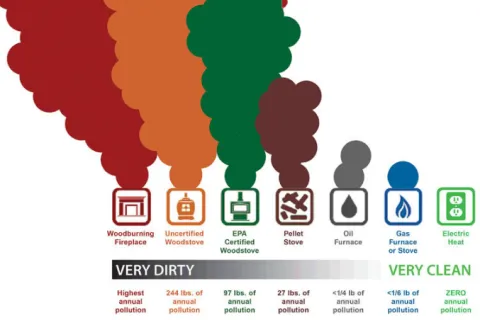Burning Wood Produces Wood Smoke and Air Pollution
We have an air pollution problem. Our air must meet federal standards for fine particle pollution under the Clean Air Act. We currently meet these standards but can be at risk if we have too many days of unhealthy air.
If we don’t clean up our air, we’ll face several issues:
- Health impacts - Breathing unhealthy levels of air pollution is not healthy. Health effects of wood smoke can affect everyone.
- Economic impacts - Federal funding for transportation (highway) projects could be at risk.
- Business impacts - Restrictions placed on large businesses located in Multnomah County, which may push jobs outside our community.
Wood Smoke is part of the problem. Check for burn restrictions before burning wood.
Ways to Reduce Wood Smoke

Heat Your Home with a Cleaner Fuel
- Use a cleaner heat source like an electric heat pump, or a furnace that uses electricity.
- Check local air quality conditions before you burn every time.
- Remember, NEVER heat your home using a gas oven, kerosene heater, camping stove or BBQ. Using space heaters as your main heating source is also unsafe.
Replace Equipment
- Use Energy Trust of Oregon cash incentives to help pay for a new efficient electric heating system.
- Uncertified wood stoves and inserts create twice as much air pollution as EPA-certified stoves. If you must burn, switch to a certified device.
- A tax credit may be available when you replace a wood or pellet stove that is at least 75 percent efficient.
If You Must Burn for Heat, Burn Cleaner
- Burn only dry, split, well-seasoned wood. Properly seasoned wood is darker, weighs less, and sounds hollow when hit against another piece of wood.
- Keep wood covered and off the ground. Store it at least 12 months before burning.
- Build small, hot fires.
- Never burn trash or construction debris such as treated wood, painted wood or particle board. They make toxic smoke and can damage your stove.
Weatherize Your Home
You can help make your home warmer by adding insulation and sealing drafts around doors and windows.
- Community Energy Project - Free weatherization and insulation workshops
- Multnomah County Weatherization Program - Weatherization assistance for those with limited income
